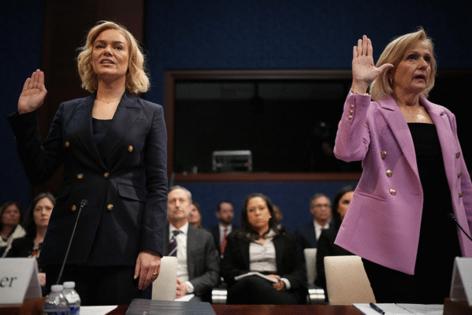Marjorie Taylor Greene says NPR, PBS use taxpayer dollars on 'radical' programming
Published in News & Features
WASHINGTON — During the latest hearing of the DOGE Subcommittee she leads, U.S. Rep. Marjorie Taylor Greene repeatedly accused the heads of National Public Radio and the Public Broadcasting Service of using the funding they receive from Congress to push a liberal agenda.
“NPR and PBS have increasingly become radical, left-wing echo chambers for a narrow audience of mostly wealthy, white, urban liberals and progressives who generally look down on and judge rural America,” Greene, R-Rome, said during the hearing on Wednesday. “PBS News is not just left-leaning, but it actively uses taxpayer funds to push some of the most radical left positions, like featuring a drag queen on the show ‘Let’s Learn.’”
House Republicans created the Subcommittee on Delivering on Government Efficiency and made Greene chair to aid Elon Musk’s efforts to reduce government spending by laying off workers, freezing funding on programs and shuttering federal agencies.
Wednesday’s hearing focused on the two national public broadcasting organizations, who each receive a portion of the $500 million Congress allocates each year through the Corporation for Public Broadcasting. Katherine Maher, NPR’s chief executive officer and president, and Paula Kerger, the president and CEO at PBS, said most of the money is sent to local public television and radio stations across the country.
Kerger told lawmakers a significant portion of the broadcast day on PBS stations consists of programming for children with an emphasis on preschool ages.
“Our programming is focused on core skills that kids need to develop before they enter school in math and in learning numbers and in learning letters, so that kids that don’t have the opportunity to be in a formal pre-K program have a chance to walk into school for the first time on equal footing with kids that have more opportunity,” Kerger said.
The GOP members of the DOGE Subcommittee repeatedly asked Maher and Kerger about the political leanings of their workforce and accused them of airing programming meant to make young children open to discussions about transgender people and systemic racism.
Democrats then accused their GOP colleagues of cherry-picking examples and ignoring public research and anecdotal evidence that the most popular and enduring programs like “Sesame Street” and “Mister Roger’s Neighborhood” have improved education outcomes for generations of children.
Massachusetts Rep. Stephen Lynch, the top-ranking Democrat on the subcommittee, which falls within the House Oversight Committee, said the committee had better uses of its time that hauling in the heads of public broadcasting networks to air partisan grievances.
“I’m sad to see that this once-proud committee, the principal investigative committee in the House of Representatives, has now stooped to the lowest levels of partisanship and political theater to hold a hearing to go after the likes of Elmo, Cookie Monster and Arthur the aardvark, all for the unforgivable sin of teaching the alphabet to low-income families’ children and providing accessible local news and programming,” he said.
Maher was asked more than once to defend social media posts she made in 2018 in which she called Donald Trump racist and a fascist. She said that she regretted the posts and did not believe Trump was racist. She also said that since being hired at NPR in January 2024 she had worked to increase standards and ensure various political views were reflected in its coverage.
U.S. Rep. Brian Jack, R-Peachtree City, was among the Republicans who indicated that their concerns about NPR and PBS programming would likely lead them to advocate reducing or eliminating the federal funding to the Corporation for Public Broadcasting.
Maher said the money NPR’s corporate office receives in federal funding, $11.2 million, is crucial but represents less than 5% of its overall budget. Jack asked whether the dollars would be missed or could be offset by additional fundraising to make up the difference.
Maher said there is a chance member stations, and their listeners, could suffer.
“If federal funding for our network goes away, it means that people in rural parts of America, places where they can’t afford to make private donations to support their local journalism — those will be harmed,” she said. “The additional harm is that Americans in places that are affluent or do have many media choices will not be able to hear from their fellow Americans that are often under-heard.”
Slashed funding for public broadcasting could be inserted into spending discussions later this year if Republicans pass reconciliation legislation mandating at least $1.5 trillion in cuts.
_____
©2025 The Atlanta Journal-Constitution. Visit at ajc.com. Distributed by Tribune Content Agency, LLC.







Comments